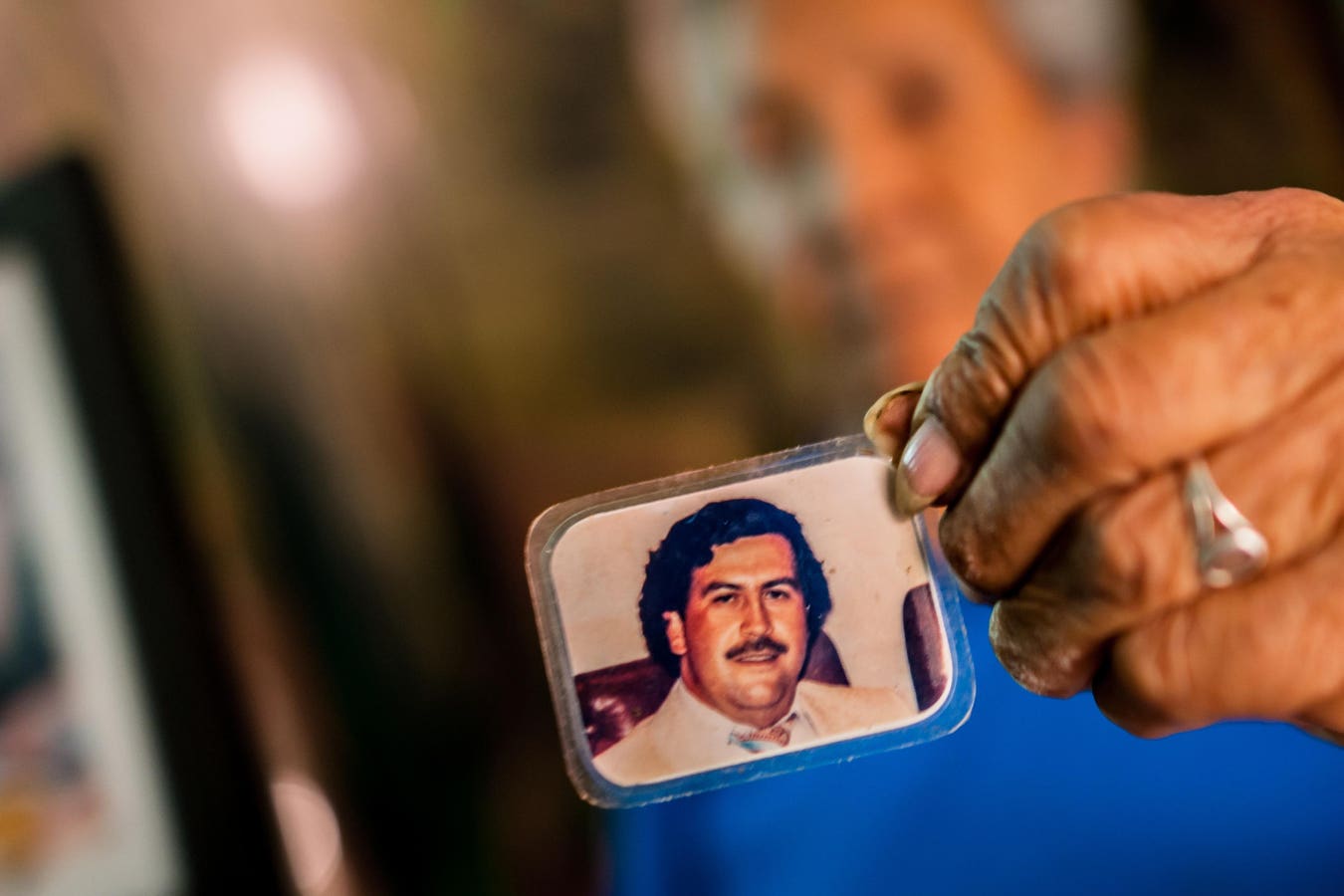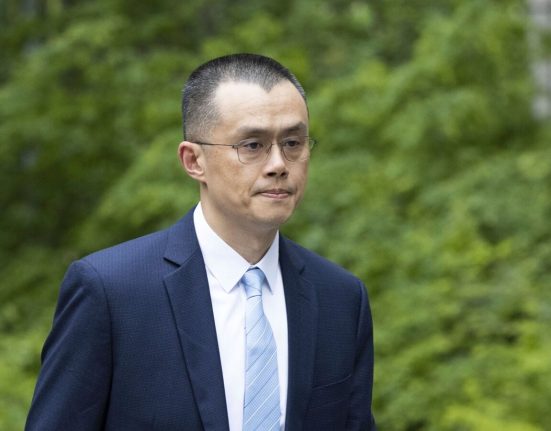Pablo Escobar died in 1993, but in this 2017 picture, a woman in Medellin, Colombia, still keeps a picture of him in her wallet.
Photo by Jan Sochor/Getty Images
Olof Kyros Gustafsson, also known as (aka) “Sir Olaf Gustafsson,” aka “El Silencio,” has pleaded guilty to six federal criminal charges related to marketing and selling products, including flamethrowers and cell phones, that he never delivered. The products were based on licensing rights tied to the late Colombian drug kingpin Pablo Escobar.
Background
According to his plea agreement, Gustafsson was the CEO of Escobar Inc., a corporation registered in Puerto Rico that held successor-in-interest rights to the intellectual property—largely, name and likeness—of Pablo Escobar. Escobar is a former Colombian narco-terrorist, most commonly recognized as the head of the Medellín Cartel. At the height of the drug trade in the 1980s, Escobar, called “The King of Cocaine,” was responsible for an estimated 80% of the cocaine smuggled into the United States—at one point, he was thought to be bringing in an estimated $420 million a week. Escobar was eventually shot and killed by Colombian police in 1993.
Escobar remained popular, and Escobar’s brother and former accountant for the Medellín Cartel, Roberto De Jesus Escobar Gaviria, registered the successor-in-interest rights as part of Escobar, Inc. According to the company’s website, “The only true rights-holder to any naming rights involving Pablo Escobar is Escobar Inc, and we defend such rights.” True to their word, in 2017, the company threatened to sue Netflix for $1 billion for alleged intellectual property violations the company tied to the popular show, “Narcos.” Escobar Inc. eventually abandoned its trademark claims.
Still, the company continued to market Escobar’s name. According to court documents, from July 2019 to November 2023, Gustafsson used the Escobar persona to market and advertise products similar to those already in the market at a substantially lower price. The products included the Escobar Flamethrower, a product modeled after the “Not a Flamethrower” marketed and sold by Elon Musk’s The Boring Company for $500. Escobar’s brother accused Musk of stealing the idea and demanded $100 million—the demand didn’t go anywhere, with Musk alluding to the allegations on X (formerly Twitter).
Despite the controversy, Gustafsson and his co-conspirators continued to market the product. They advertised the Escobar Flamethrower for less than half of the amount Musk was seeking: just $249. Despite receiving payment from customers, Escobar Flamethrowers were not delivered.
The purported products also included several phones, including the Escobar Fold Phone (available for sale for $349) and an “upgraded” Escobar Fold 2 Phone, marketed as a competitor to the Samsung Galaxy Fold phone (available for sale for $400). The company promoted the phones on a website it owned called RIPSamsung. The video for the phone—which remains available on YouTube—showed a bikini-clad woman smashing up Galaxy Fold phones with a sledgehammer and has been viewed over 800,000 times. A similar video promoting the “Escobar Fold Phone” has been viewed more than two million times on YouTube. RIPSamsung.com no longer exists (it redirects to the Escobar Inc. website)—according to the company, Samsung filed a complaint over the use of the domain—and won—in 2020.
The Escobar Gold 11 Pro Phone was similarly marketed as a refurbished Apple iPhone 11 Pro, plated in 24 karat gold, and available for sale for $500. In 2020, Escobar Gaviria claimed to have filed suit against Apple, seeking $2.6 billion in damages. The suit, which was allegedly filed by Escobar Gaviria individually, was posted on the company’s website.
Despite the drama, phones were not delivered to paying customers.
Gustafsson also advertised Escobar Cash, marketed as the world’s first “physical cryptocurrency.” Escobar Cash was available for sale in several denominations at a U.S. dollar conversion rate of 1/1000th of U.S. dollar face value. The cash has been described as a combination of “two worlds, the physical world and the virtual world” by using “hybrid cash notes, notes that are backed by cryptocurrency and tied to the blockchain.” (A book penned by Escobar Gaviria about the currency remains for sale on Amazon, and Gustaffson is listed as an additional author.)
To keep the scheme going, Gustafsson and his co-conspirators would send crudely-made samples of the products to reviewers and social media influencers to increase demand. For example, he sent Samsung Galaxy Fold Phones wrapped in gold foil and disguised as Escobar, Inc. phones to online tech reviewers to induce victims who watch online reviews into paying for and purchasing the non-existent Escobar, Inc. products.
Rather than sending the products, Gustafsson would send a “Certificate of Ownership,” book, or other promotional materials to customers so that there was record of a mailing. When a paying customer would attempt to obtain a refund when the product was never delivered, Gustafsson fraudulently referred the payment processor to the record of mailing as “proof” that the product was shipped and received by the customer. That would mean the refund requests would be denied.
Eventually, several payment processors, including PayPal, cut ties with the company due to the complaints. The items are also no longer available on the company’s website, though the website remains online. Before the items were removed from the site, Gustafsson and his co-conspirators received hundreds of orders. The take, according to court documents? At least $1,300,193.
Gustafsson also arranged to open bank accounts in the United States, Sweden, and the United Arab Emirates. The accounts were opened under his name and entities he controlled to be used as funnel accounts—bank accounts into which he deposited the proceeds from his criminal activities. The goal was to conceal and disguise the nature, location, source, ownership, and control of the proceeds.
He would then transfer and launder the funds through various bank accounts, including accounts in the Central District of California and elsewhere in the United States and abroad. Ultimately, the funds landed in accounts owned by Gustafsson, his family members, and others, who would then use the funds for their own personal use.
Arrest
Gustafsson was arrested in Marbella, Spain, in December 2023. He was taken into federal custody in the United States on March 28, after he was extradited. When he was taken into custody, he was arraigned on a 115-count federal indictment, including one count of conspiracy to commit wire fraud and mail fraud, nine counts of wire fraud, three counts of mail fraud, one count of conspiracy to engage in money laundering, 41 counts of money laundering, 35 counts of international money laundering, and 25 counts of engaging in monetary transactions in property derived from specified unlawful activity.
According to court documents, Gustafsson is represented by Meghan A. Blanco of the Law Offices of Meghan Blanco. Blanco did not immediately respond to a request for comment.
Criminal Charges
Gustafsson pleaded guilty to one count of conspiracy to commit wire fraud and mail fraud, one count of wire fraud, one count of mail fraud, one count of conspiracy to commit money laundering, one count of concealment money laundering, and one count of international concealment money laundering.
Wire fraud involves wire communication—in this case, the internet—sent across state lines to promote or commit fraud, while mail fraud involves the use of the U.S. Mail (or other mail carriers) to execute a scheme.
Money laundering is the process of converting “dirty money” meaning that it was from illegal sources into “clean” money, or legitimate cash so that it can’t be traced. The easiest way, of course, is to run the cash through a bank or other financial institution and replace those bad dollars with shiny new ones—that’s why federal laws require that large transactions be reported. When illicit funds are transmitted money from a place inside the United States to or through a place outside the United States, that’s international money laundering.
Conspiracy charges mean that two or more persons agreed to commit a crime (in this case, wire fraud, mail fraud and money laundering) and the defendant joined, knowing the purpose of the scheme and intending to help accomplish that purpose. Court documents did not name the co-conspirators in the case.
Sentencing
Following his guilty plea, Gustafsson is scheduled to appear before U.S. District Judge Fernando L. Aenlle-Rocha for sentencing. He faces a statutory maximum sentence of 20 years in federal prison for each fraud-related count and up to 10 years in federal prison for each money laundering-related count. That means the total maximum sentence for all offenses is 120 years imprisonment. In addition, he faces up to a 3-year period of supervised release, a fine of $2,250,000 or twice the gross gain or gross loss resulting from the offenses (whichever is greatest), and a mandatory special assessment of $600.
As part of his plea agreement, Gustafsson has agreed to pay up to $1.3 million in restitution to victims, as well as to forfeiture to funds that were proceeds of the fraud schemes, including money currently held in a bank account in Sweden.
IRS Criminal Investigation
IRS Criminal Investigation (IRS-CI), the FBI, and the Federal Deposit Insurance Corporation-Office of Inspector General investigated the matter, with assistance from the Department of Justice’s Office of International Affairs, the United States Marshals Service, Eurojust, Spanish authorities, and French judicial authorities.
CI is the sixth-largest law enforcement agency in the U.S. and is the criminal investigative arm of the IRS, responsible for conducting financial crime investigations like tax fraud, narcotics trafficking, money laundering, public corruption, healthcare fraud, and identity theft. While other federal agencies also have investigative jurisdiction for money laundering and some bank secrecy act violations, the IRS is the only federal agency that can investigate potential criminal violations of the tax code. The agency has 19 field offices located across the U.S. and 14 attaché posts abroad.







